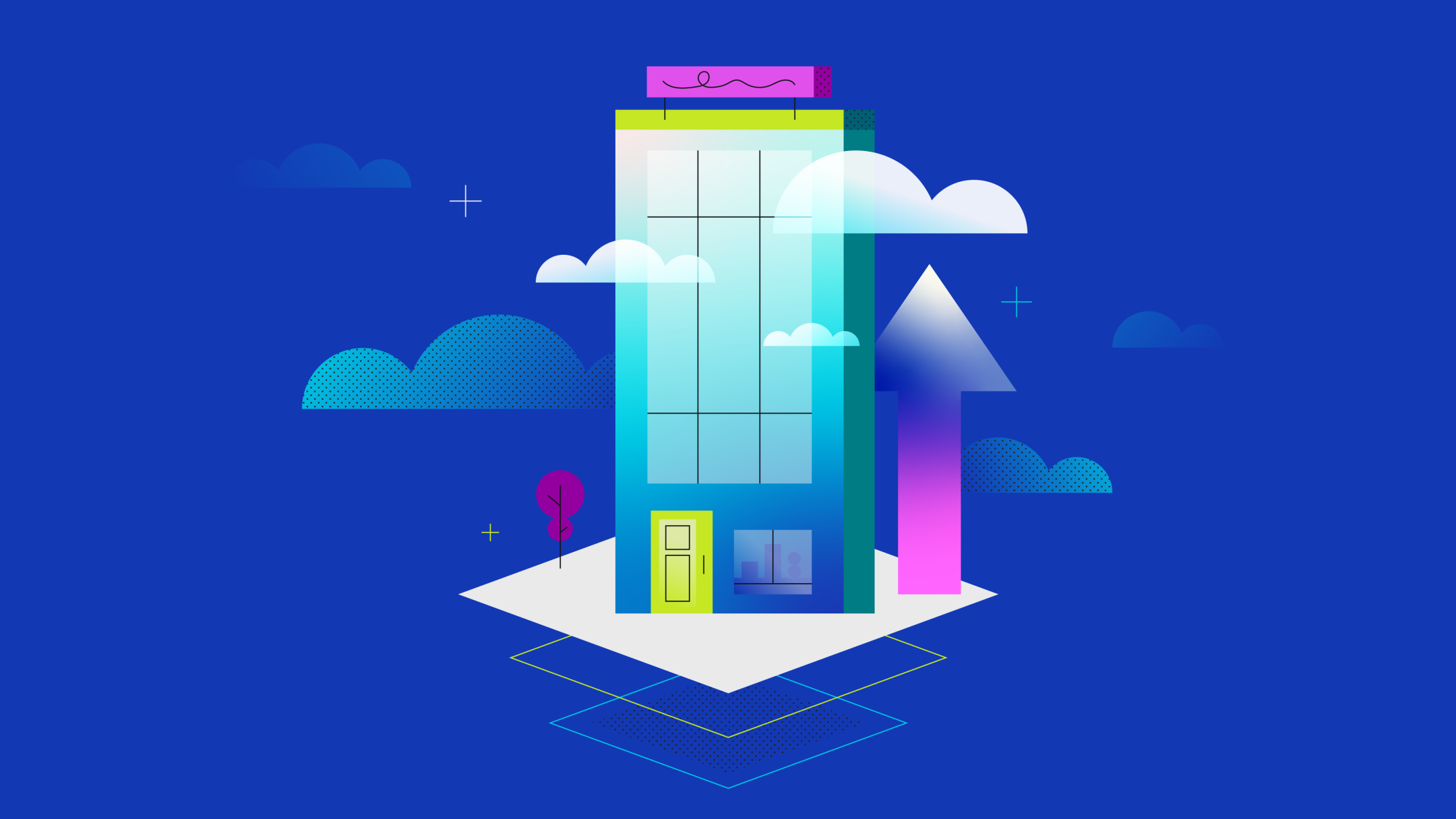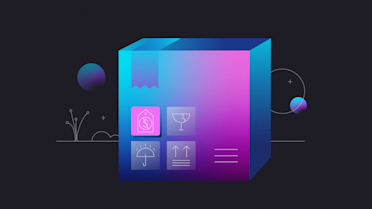Illustration by Melanie Peters
This year, global ecommerce sales are expected to hit$5 trillionfor the first time ever. While global ecommerce growth has been slowing as the COVID-19 pandemic eases, it’s still on an overall upward trajectory and is projected to hit more than $7 trillion by 2025.
These stats provide a look into how quickly and robustly the ecommerce industry is growing. They also show how much competition is entering theglobal ecommerce space.
If you want to stay ahead of the competition and snag a healthy portion of that multitrillion-dollar pie, you have to invest in a reliable and scalable enterprise ecommerce tool.
This article will cover everything you need to know about enterprise ecommerce tools and help you select one for your ecommerce enterprise.
- What is an enterprise ecommerce system?
- What are the main advantages of enterprise-level ecommerce platforms?
- Types of enterprise ecommerce software
- Enterprise ecommerce software solutions
What is an enterprise ecommerce system?
Anenterprise ecommerce systemis a comprehensive software that helps large businesses operate online and grow sales efficiently. An excellent enterprise ecommerce solution will help large business owners make more sales, manage inventory, and track customers, and will provide solutions to streamline operations.
Enterprise ecommerce systems differ from smaller ecommerce platforms because they’re built for high-volume and high-growth companies.
“Enterprise-level ecommerce platforms offer a high degree of scalability. As businesses grow, they need an ecommerce platform that can handle increased traffic and transactions. Enterprise-level platforms are built on a robust infrastructure that can support a large number of users and transactions,” says Will Yang, head of growth atInstrumentl.
As such, enterprise software typically has more features, is highly customizable, and integrates withother essential ecommerce toolsand ERP systems.
Features business owners should look for in an enterprise ecommerce system include:
- Customizable to match the design and needs of your store
- 可伸缩的增长提供支持
- Unlimited bandwidth and web hosting (cloud-hosted)
- High-speed performance with global dual content delivery networks
- Robust integrations with other leading ecommerce tools
- Tight security features and Level 1 PCI compliance
- Access to data migration tools
- Mobile commerceapps that are easy to use
- Point of sale (POS)
- User-friendly and easy to navigate
- Design templates
- Omnichannel content delivery
- Reliable and accessible support team
What are the main advantages of enterprise-level ecommerce platforms?
Smaller ecommerce platforms are designed for small and medium-sized businesses (SMBs) that don’t see high traffic volumes and don’t capture hundreds of thousands to millions of dollars in sales.
If you’re running a small ecommerce store and only manage a handful of sales every day, there are plenty of ecommerce solutions that will suit your needs.
But, as soon as your business starts to grow, it’s essential tomigrate from your legacy or small ecommerce platformto an enterprise platform that can adequately handle the volume of an enterprise ecommerce business.
Think of it like hosting an event. If you’re hosting a small dinner party for your work friends, you can invite your guests into your home and provide a wonderful experience. If you’re hosting a gala for your industry, your home won’t do. To accommodate your needs and the needs of your guests, you need to rent a large, classy event space.
“The main benefit of being an enterprise-level ecommerce platform is the bandwidth to cater to any ecommerce business, regardless of size, and help them scale,” saysGabrielle Wooden, senior content marketing manager at Tapcart.
But providing enough bandwidth to keep your site up and running during traffic surges isn’t the only benefit of enterprise-level ecommerce platforms.
“The main advantage of enterprise-level ecommerce platforms is that they are scalable and can grow with your business. They offer features that are not available in the free software. They also have integrations and partnerships with other vendors,” said Krittin Kalra, founder ofWritecream.
“Enterprise-level platforms offer a wide range of features and functionality, from sophisticated search and navigation to powerful marketing and merchandising tools. This allows businesses to tailor their ecommerce solutions to their specific needs and requirements,” adds Will Yang.
“These platforms also offer excellent security and compliance features. This is essential for businesses that handle sensitive customer data or are subject to industry regulations.”
Types of enterprise ecommerce software
To understand the different types of ecommerce solution options (and pick the right one), it’s first essential to understand the technical, behind-the-scenes aspects of what is required to run an online store effectively.
All ecommerce stores need:
- Hosting. Since online stores are ecommerce websites, they need to acquire server space on the web. To make it easier, think of it in terms of housing. The server is the house—space to live. Hosting is how you go about securing that space. For example, you can build a house, buy a house, rent a house, or share a house. It’s the same with hosting. Additionally, hosting (like houses) provides accessibility, security, and reliability.
- Front-end features. The front end of your site is your digital storefront. It includes everything customers see and interact with when they land on your hosted ecommerce store, such as design, product description pages, shopping carts, and search bars.
- Back-end functionality.Coming in hot with another Computer Geek term, “back end” simply means the server side of your site. The back end processes, stores, and transmits all relevant data likeproduct information, order history, and customer data. It also uses those ones and zeroes to communicate messages between the server and the front end, so customers can see when there’s a stockout and your employees know when to make a new order.
The different types of enterprise ecommerce software solutions simply refer to how many of these tasks you want to build, maintain, and manage yourself.
Let’s take a look at the three main types of enterprise ecommerce solutions.
1. What is a SaaS enterprise ecommerce solution?
SaaS stands for software-as-a-service. Enterprise ecommerce solutions are one type of SaaS solution. There are also SaaS solutions for marketing, advertising, sales management, customer management, operations, and analytics.
SaaS is growing rapidly in popularity across all industries. In fact,Statista reportsthe SaaS industry will exceed $100 billion by the end of this year.
It makes sense why SaaS is growing so rapidly. It’s popular among non–technically trained business owners and ecommerce merchants because it does the hard work from a single platform.
With a SaaS enterprise ecommerce solution, you rent your server space and the SaaS solution manages everything. This means you don’t have to go outside of the SaaS platform to get hosting, secure your website, comply with PCI standards, maintain your platform, or manage the uptime of your site.
A SaaS enterprise ecommerce solution also provides quick and easy front-end functionality. You can design your store, set up your shopping cart, add your products, and flesh out your product pages from within the platform.
But that’s not all. A SaaS platform also helps you manage your back-end operations, so you can track, store, and manage orders from within the platform.
In essence, a SaaS solution takes the technical DIY out of the equation and does it for you. The one tradeoff is you have less back-end and code-level control.
2. What is a headless enterprise ecommerce solution?
Aheadless ecommerce enterprise solution是一个类型的SaaS解决方案和智能创新commerce tech. All headless ecommerce solutions are SaaS, but not all SaaS ecommerce platforms are headless.
With a headless ecommerce solution, you get similar hosting and back-end functionality to a traditional enterprise ecomm SaaS tool. For example, it will provide PCI compliance, inventory management, and tight security.
The difference is that it decouples the front-end and back-end architectures and offers more flexibility to customize the front-end experience, or “the head.”
“We’re seeing many companies choose a headless ecommerce solution because it allows them to create unique, rich experiences for their customers. By using a headless solution, they benefit from a faster site, omnichannel capabilities, and deeper personalization,” says Lidia Infante, senior SEO manager atSanity.
“Headless platforms are essential for DTC brands, in particular, who use digital experiences to communicate their values and build strong relationships with their customers in a highly competitive landscape.”
Aheadless SaaS ecommercesolution is an excellent choice for enterprises that:
- Need more flexibility with design and UX
- Want to customize the customer journey
- Operate in a quickly evolving industry
- Plan to scale rapidly
- Want to make changes to the front end of the site without affecting back-end operations
3. What is an open source enterprise ecommerce solution?
开源电子商务企业解决方案是开放的n to anyone and sometimes free to download and use. The caveat is you have to do a lot of the coding yourself to create and customize your store.
“There are some great advantages to leveraging an open source ecommerce platform like Adobe Commerce, formerly Magento. Ultimately, open source gives you complete control. Although, this control comes at a cost financially and it’s resource-intensive,” saysecommerce consultantElliott Davidson.
“另外,与Shopify加上这样的一个平台,you don’t need to do regular software updates to prevent security risks. Shopify Plus takes care of this for you. To protect you against security risks from an open source perspective, you’ll have to either hire an agency on retainer or take this in-house.”
Using an open source platform may be a good option for highly skilled coders, but it’s crucial to remember you don’t get the same all-in-one functionality that you get with a SaaS solution. You’ll have to purchase and manage any third-party apps, add-ons, or extensions you use to run your store. You also have to pay for licensing, design, hosting, maintenance, and PCI compliance.
“The TCO [total cost of ownership] from an open source platform can be very costly and tends to be more expensive than the SaaS counterpart,” says Davidson. “You really have to ask yourself if you even need this extra control. In most cases the answer is no.”
Enterprise ecommerce software solutions
1. Shopify Plus
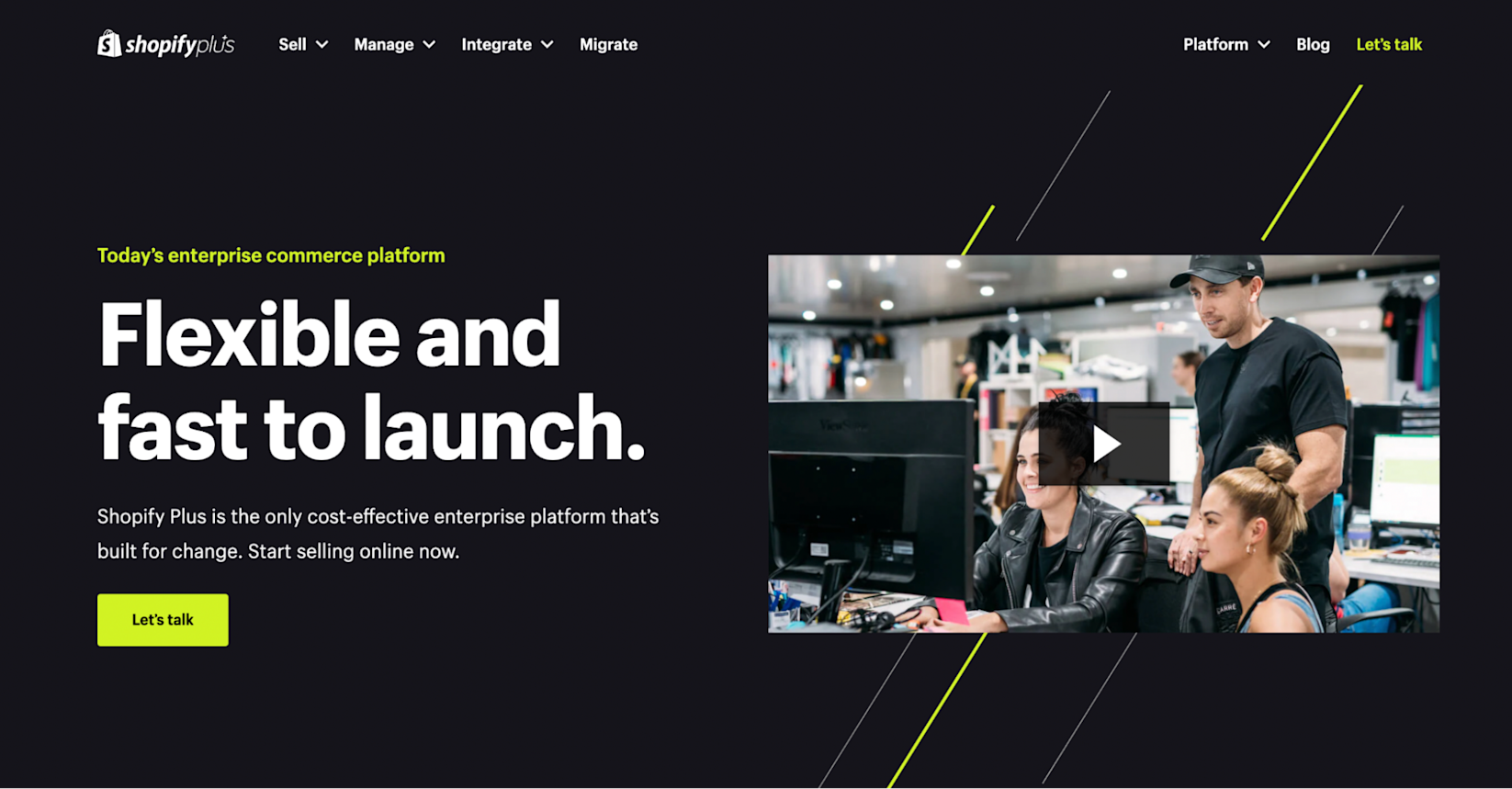
Shopify +是一个headless enterprise ecommerce SaaS platform used by more than 10,000 enterprises across 175 countries to host ecommerce businesses. Shopify Plus is built with scalability in mind and it’s flexible, quick-to-launch, and affordable.
Since it’s aheadless ecommerce SaaS platform, it does the heavy lifting on the back end. It also allows you to change the front end of your store with ease whenever you see fit.
Brands using Shopify Plus include Staples, Heinz, Allbirds, Magnolia, Rebecca Minkoff, and Steve Madden.
Shopify Plus features
Shopify Plus features include:
- Enterprise online store. Advanced customization options across all devices, speedy checkout, and easy scalability.
- Reliable bandwidth.Unlimited growth potential, as it has an average uptime of 99.99%.
- International ecommerce.Allows global transactions in localized currencies and languages across every market.
- Omnichannel commerce.Support and integrations to sell to all of your customers, across all channels.
- Headless commerce. Change the front end of your store at any time to meet customer expectations and industry trend demands.
- Point of sale.Excellent point of sale that lets you capture sales online, across retail locations, and in pop-up stores.
- Integrations. Countless integrations to help you streamline all ecommerce operations.
- Detailed reporting.Keep an eye on inventory,trends, and customer data with excellent reporting.
- Automation. Don’t think twice about your ecommerce operations. Set them up once and let Shopify Plus do its thing.
Shopify Plus pros and cons

Pros: Shopify Plus is touted for being a fully hosted, headless ecommerce platform that is easy to navigate and streamlines commerce operations. It is the perfect tool foromnichannel commerceand has hundreds of extensions and plug-ins to help enterprises customize their store. Shopify Plus also has dedicated, 24/7 support. Best of all, Shopify Plus is incredibly reliable, stable, and can support unlimited growth.
Cons: Since Shopify Plus is a fully hosted SaaS tool, there is limited flexibility for coding. Shopify Plus doesn’t allow for open-source alterations to code or build modules from scratch. It does, however, allow for extensions and app integrations.
What customers are saying about Shopify Plus
Shopify Plus has a 4.8 star rating on Capterra. Customers love Shopify Plus for its scalable architecture, ability to boost conversions, and its comprehensive RESTful API.
Capterra reviewer Greg H. gave this verifiedreview:
“Shopify Plus has been a game changer for us. Conversion rates improved 50% after deployment. Site speed is phenomenal, the dashboards are great, uptime is great, and access to the app catalog cuts development time down to a matter of days. We have deployed more features and services in less than a year, something which would have taken multiple years at 3-4x the cost on our prior platform.”
2. BigCommerce Enterprise
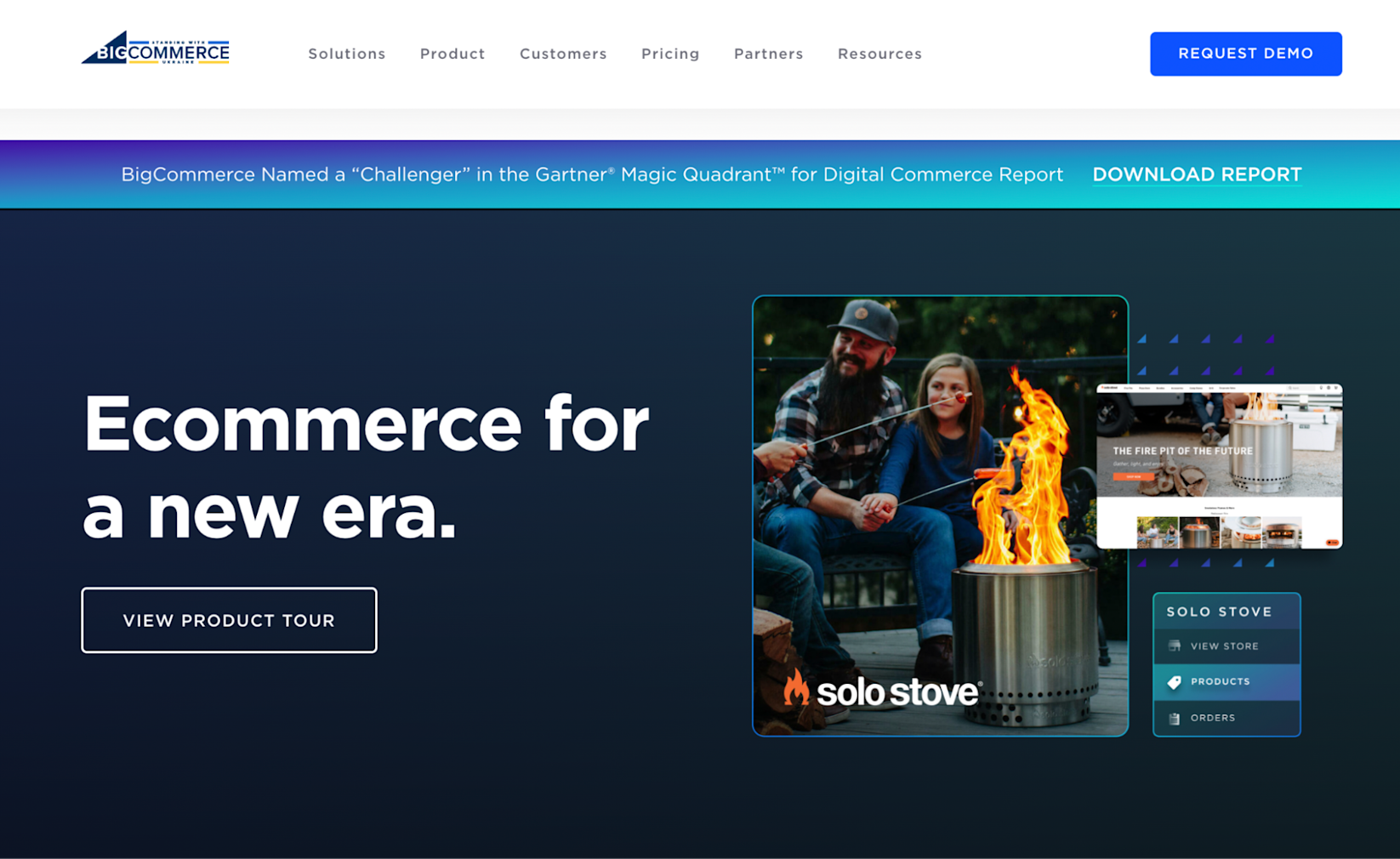
BigCommerce is an open SaaS ecommerce solution that combines SaaS and API-enabled openness, making it a highly flexible platform to help you customize your store. BigCommerce is another platform that is designed to help you scale quickly and reach an international market.
Brands using BigCommerce include MitoQ, Solo Stove, Skullcandy, Uplift Desk, and Burrow.
BigCommerce features
- Native B2B and B2C.Serves both B2C and B2B enterprises.
- Multi-storefront and localization.Manage multiple stores from one ecommerce platform.
- Omnichannel commerce.Create omnichannel shopping experiences, wherever your customers are.
- Open APIs.Customize your store with open APIs.
- Frictionless checkout.Set up speedy checkout for an enhanced customer experience.
- Abandoned cart recovery.Includes essentials to automate abandon cart recovery and capture more sales.
- Reliable. Boasts of 99.99% bandwidth, even during popular shopping holidays.
- Security.ISO/IEC 27001:2013 & PCI DSS 3.2, Level 1 certified.
BigCommerce pros and cons
Pros:BigCommerce is another commonly used enterprise platform that is well-suited for businesses of all sizes. It’s possible to start with BigCommerce as a smaller enterprise and grow on the platform with ease. It also has inclusive features in its entry-level product options, making it easy to add and manage items in your product catalog.
Cons:Some customers complain about the high price point for the number of features, and that the support team doesn’t often have the answers to technical questions.
What customers are saying about BigCommerce
While this platform has a lower overall rating than Shopify Plus on G2 and Capterra, it still has mostly positive customer reviews. G2 gives it a customer rating of 4.2 and Capterra rates it with 4.4 stars out of 5.
BigCommerce user Roland B. provided thisfeedback on Capterra:
“Pros: Very easy set up. Once you or your client chooses a theme it is a pretty straight forward process getting your store online. Cons: I would say the thing I liked least is not having some sort of builder for basic web pages. Too much customization needs to go into creating custom category pages.”
3. Adobe Commerce
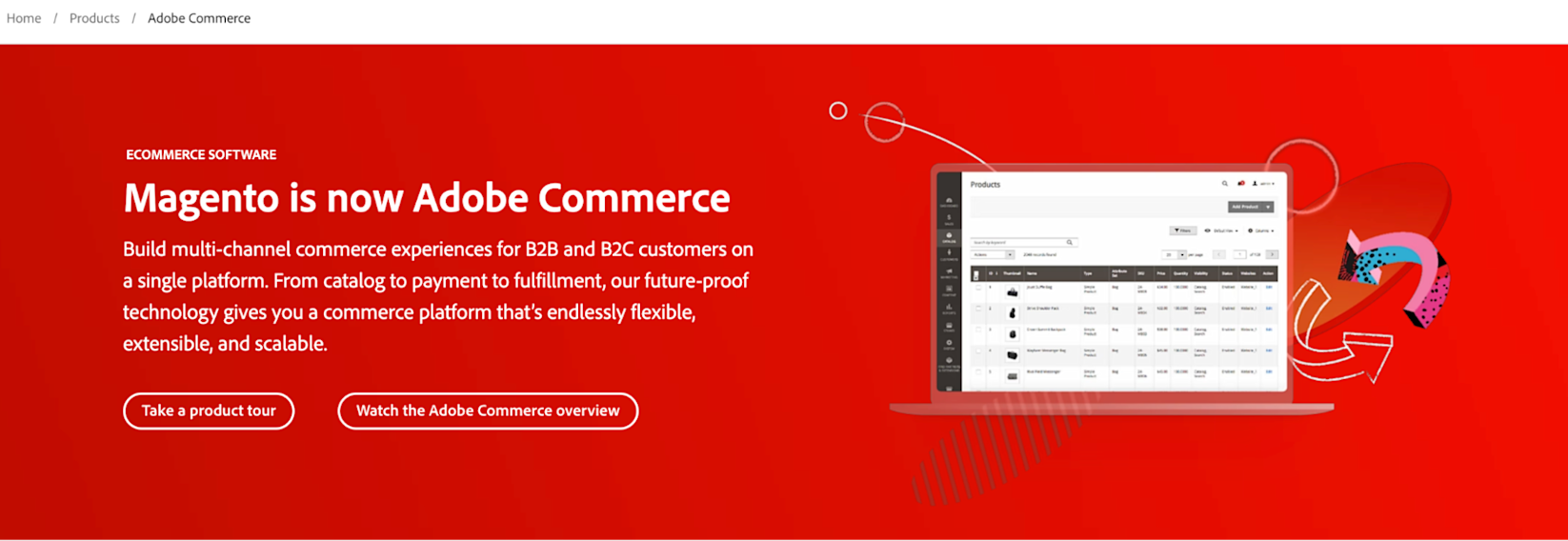
Adobe Commerce, the artist formerly known as Magento, is a multi-channel enterprise ecommerce solution that helps its customers optimize across the digital shelf. Adobe Commerce is a highly flexible platform with an adequate price point.
品牌使用Adobe商务包括康涅狄格州的家Plus, Claire’s, DISH, Pearson, Cora, and The Walt Disney Company.
Adobe Commerce features
Here are some of the features of Adobe Commerce:
- Page builder. Intuitive drag-and-drop page builder to help customize your store without needing to know how to code.
- Product recommendations.Drag and drop product recommendations to prioritize your most essential products.
- Inventory management.Customization options like ship to home, buy online, pickup in-store, andstock management features.
- Integrated B2B.Integrate with other back-end systems and customize the design to match.
- Reporting.Detailed analytics to give you a comprehensive view of store performance.
- Extensions.Full marketplace with many extensions to boost the functionality of your store.
Adobe Commerce pros and cons

Pros: Adobe Commerce is one of the largest open source ecommerce software solutions on the market. This means it’s highly flexible and you can customize it however you like.
Cons: Since Adobe Commerce is open source, you have to be an excellent developer to get the most out of it. You’ll also be responsible for updates, PCI compliance, and everything else a SaaS solution would handle for you. It can also be more expensive, depending on what integrations you need.
What customers are saying about Adobe Commerce
Adobe Commerce has a 4.0 rating on G2 and a 4.3 rating on Capterra. Customers who are skilled developers tend to review the software positively, but also point out that development costs can be expensive, and there are more cost-effective options.
Here is what Capterra reviewerLena V.said:
“Pros: I like how everything I need is easily accessible through the software, I don't have to integrate a lot of different things to have a fully functional store. Cons: Sometimes some of the setup can be a bit difficult and the pricing could be more competitive.”
4. Salesforce Commerce Cloud
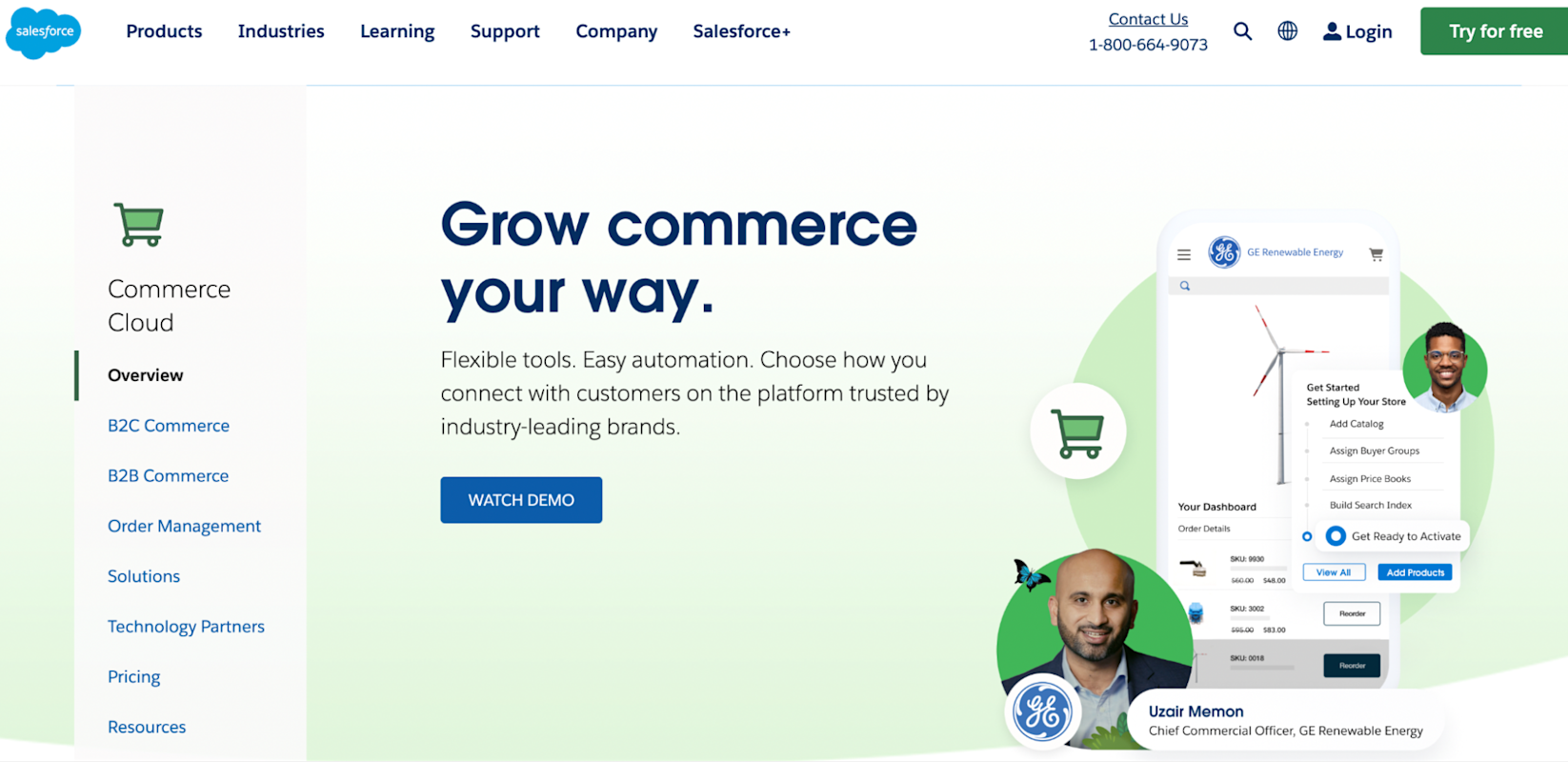
Salesforce Commerce Cloud is an enterprise ecommerce solution that helps its clients with omnichannel order management. The platform is flexible and provides an accurate and detailed view into inventory from a single platform.
Recognizable brands using Salesforce Commerce Cloud include Amazon, Costco Wholesale Corporation, Comcast, FedEx, and LVMH Group.
Salesforce Commerce Cloud features
- Headless commerce. Customize the front-end experience with headless commerce.
- Automation tools.Simplify processes including fulfillment with helpful automation.
- Order management. Sell your products across platforms and keep your inventory organized.
- Payment tech. Secure customer transactions with easy payment methods and quick implementation.
- B2B and DTC features.Grow yourB2B or DTC businesswith customizable features for either business type.
- AI for commerce. Boost sales and customer engagement with its unique tool, Einstein AI.
- Commerce + CRM.Connect your store and commerce operations to the tools you use for marketing, sales, and customer service.
Salesforce Commerce Cloud pros and cons

Pros:Salesforce Commerce Cloud is one of many Salesforce products, and it integrates well across its other solutions. The platform has several features and can help you streamline and optimize the sales funnel.
Cons:Since Salesforce Commerce Cloud is so robust, it can also be challenging to learn and complicated to manage. You need to be highly tech-savvy to get the full benefits of the platform.
What customers are saying about Salesforce Commerce Cloud
Customers rate Salesforce Commerce Cloud with 4.2 stars on G2 and 4.3 stars on Capterra. Customers typically like its many features and robust functionality, but complain it can be buggy and difficult to digest all of the information.
Here’s whatCapterra reviewer Leticia L. said about Salesforce Commerce Cloud:
“Pros: It has many features, is very detailed, and can help you in every part of the sales funnel. It has a good integration with other apps, but you need a team to make it happen faster. Cons: Because it is so detailed, it is sometimes difficult to have quick information in the palm of your hand, especially when providing dashboards and reports.”
5. Oracle Commerce
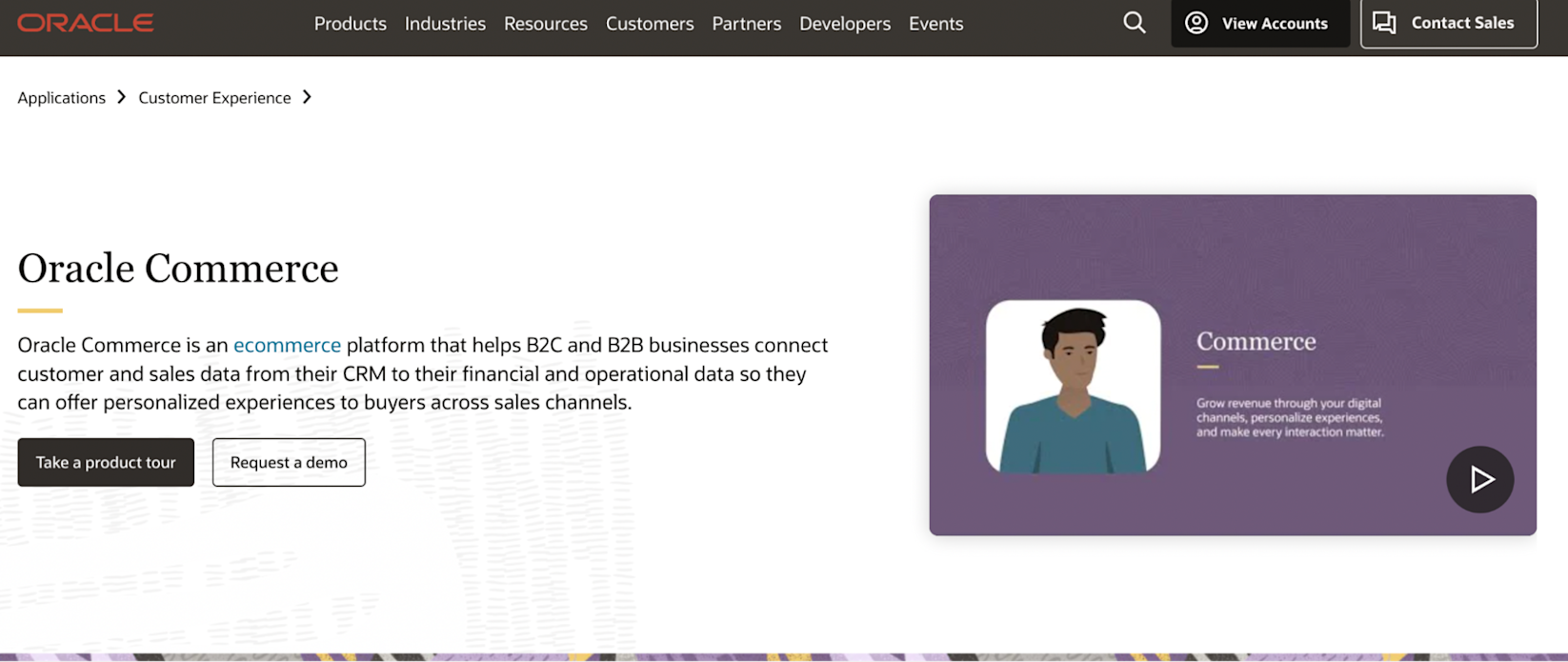
Oracle Commerce is a cloud-basedecommerce platform, designed for businesses of all sizes. It helps businesses simplify their tech stack by connecting customer, sales, financial, and operational information together.
Companies using Oracle Commerce are Banco Nacional, Bruno Fritsch, Carmen Steffens, Groupo Universal, and Delly’s Food Service.
Oracle Commerce features
- Unified B2B and B2C platform.结合B2B的d B2C functionality to simplify your tech ecosystem.
- Multi-site capabilities. Run multiple sites from the same platform and with one subscription.
- Search functionality.Onsite search capabilities to help your customers find what they are looking for.
- Product recommendations.Personalized product recommendations that are contextually relevant to customer behavior.
- Subscription management integration.Grow your revenues by giving customers subscription options.
- 甲骨文的内容管理。Streamline content creation to promote your store and meet customer expectations.
Oracle Commerce pros and cons
Pros: Oracle Commerce has good out-of-the-box features that help you get your site up and running quickly. This includes content management, product recommendations, and subscription management.
Cons: This tool is not as comprehensive as other tools on the market and can sometimes be outdated. It can also be challenging to fully customize your store.
What customers are saying about Oracle Commerce
Out of the five enterprise ecommerce tools listed, Oracle Commerce has the lowest reviews on G2 and Capterra. It has 3.7 stars on Capterra and 4.3 on G2.
A front-end developer, Edwin Alexander O.,said this on G2:
“It allows a great personalization of the store since it uses technologies such as Knockout, RequireJS and LESS, if we combine this with the modularity that the platform possesses, we find a fairly powerful formula for your ecommerce…One of the biggest problems that the platform has is that the documentation is too much and it is not correctly classified making it take hours to find the solution to a problem, you always have the support by chat, but usually they direct it to the documentation which is very confusing.”
How to choose an enterprise ecommerce software
There are several excellent enterprise ecommerce platforms on the market. The platform you choose for your business will depend on how big your company is, how experienced you are with coding, what your needs are, and how fast your store will grow.
“To choose the right enterprise ecommerce software, start by evaluating your needs and objectives. Once you clearly understand what you need, you can begin researching different platforms,” says Instrumentl’s Will Yang.
“When narrowing down your options, be sure to read online reviews and compare pricing options. You also need to make sure that the software is easy to use and can be seamlessly integrated into your existing systems. Once you’ve selected a few final candidates, take the time to test out the software before making your final decision.”
More concretely, here are some specific things to look at when choosing an ecommerce software:
- Functionality. Consider your main ecommerce goals and what you want your ecommerce platform to do for you on the front end and on the back end. When you know what you want out of your tool, you can browse the various platform features and see what suits you best. For example, if you want more flexibility with the front-end design, you’ll want to opt for Shopify Plus. If you need to build custom back-end features, consider something like Adobe Commerce.
- Your expertise.How much expertise do you have with development? What skills, budget, and team do you have to support the technical aspects of your store? Considering this will help you decide between a traditional SaaS tool, a headless commerce tool, and an open-source tool.
- Cost.Prices vary significantly from tool to tool and plan to plan within specific enterprise platforms. Determine what functionality you need to grow and how much revenue you’re bringing in, and find the tool that matches your goals and budget.
- Scalability.Not all platforms are built with support for rapid-fire growth. If you’re a quickly scaling business, look for a platform that innovates quickly, updates its software often, and provides the bandwidth you need to capture more customers.
- Performance.If your ecommerce store goes offline, you’re at risk of losing out on thousands in potential sales. When selecting an ecommerce platform, ask about performance and what their average uptime is.
- Security.If you’re not versed in what it takes to become PCI compliant or don’t want to do the hard work yourself with a self-hosted platform, then opt for a SaaS platform that takes care of PCI compliance for you.
- Integrations.Successful ecommerce is about more than having a good-looking store. You also need to manage your sales operations, inventory, customer data, marketing operations, and employees. Look for a platform that streamlines all of your operations.
- Apps.While ecommerce platforms provide a lot of features and benefits to help you run your store, they don’t do everything. But they should have apps or API functionality to help you easily connect with your other favorite tools.
- Support for multi-channel.Today’s customers shop across several channels and touchpoints. As such, you need an ecommerce platform that helps you reach your customers—no matter where they are shopping. Pick a tool that supports multi-channel sales and marketing.
When in doubt, schedule a demo
Enterprise ecommerce solutions come with many different features. If you’re still wondering what solution is for you, schedule a demo of your choices.
“One of the best ways to choose an enterprise ecommerce software is to understand the benefits and drawbacks of the available options,” says Tapcart’s Gabrielle Wooden. “Scheduling software demos are an excellent way for brands to understand each software better and get a better feeling for the customer support available to brands that are new to the software.”
Upgrade to an enterprise ecommerce software
If you’re looking to boost your revenues and grow your online store, it’s essential to upgrade from a traditional ecommerce solution to an enterprise solution.
Pick a platform that is designed withtrends in mind, continually innovates, and provides the support you need to meet your customers with excellent experiences—no matter where or when they shop. (We recommend Shopify Plus.)
Enterprise ecommerce software FAQ
What is an ecommerce enterprise system?
An ecommerce enterprise system (ECES) is a software solution designed specifically for large online stores (i.e., stores making more than $5 million in revenue). An ECES helps merchants manage their entire business operations, including order management,inventory control, customer relationship management, and marketing automation.
A good enterprise system includes an integrated suite of applications that helps merchants automate their business processes and streamline their workflow. The goal of a solution is to provide a single point of access to all aspects of the retailer’s business.
What is the main advantage of an enterprise-level ecommerce platform?
电子商务平台被设计用来简化entire customer experience from start to finish. They provide rich features such as inventory management, order fulfillment, abandoned cart recovery,logistics, returns, and payment processing.
There are several advantages to choosing an enterprise-grade ecommerce platform. But the main advantages include enhanced security, faster performance, better reporting, excellent integrations, and advanced analytics.
How do you know if it’s time to move from a traditional ecommerce platform to an enterprise platform?
Businesses eventually run into issues with standard ecommerce platforms when they start growing more rapidly or when they reach a gross merchandise value (GMV) of more than $5 million.
If businesses that are rapidly scaling start seeing poor site speed or can’t handle the amount of traffic they are getting, it’s time to switch from a traditional platform (e.g., Shopify) to an enterprise platform (e.g., Shopify Plus).
Additionally, if an ecommerce enterprise wants to do more with its store in terms of adding cool features, upgrading to an enterprise platform is the way to go. Enterprise ecommerce will allow for vivid imagery, background video, and cool CSS effects. These features usually take up a lot of server space. If you want your site to continue to load instantaneously and meet your business needs, it's essential to sign up for an enterprise plan with more speed, better user experience, UX features, and improved performance.
Which platform is the best for enterprise ecommerce?
As a retailer, you want to offer your customers the best experience possible. That means having a great shopping cart software solution that allows them to easily add items to their carts and checkout without hassle.
While there are hundreds of ecommerce platforms available, the right one for you depends on your needs, budget, whether or not you have a multi-store model, and growth goals.
We suggest Shopify Plus.
